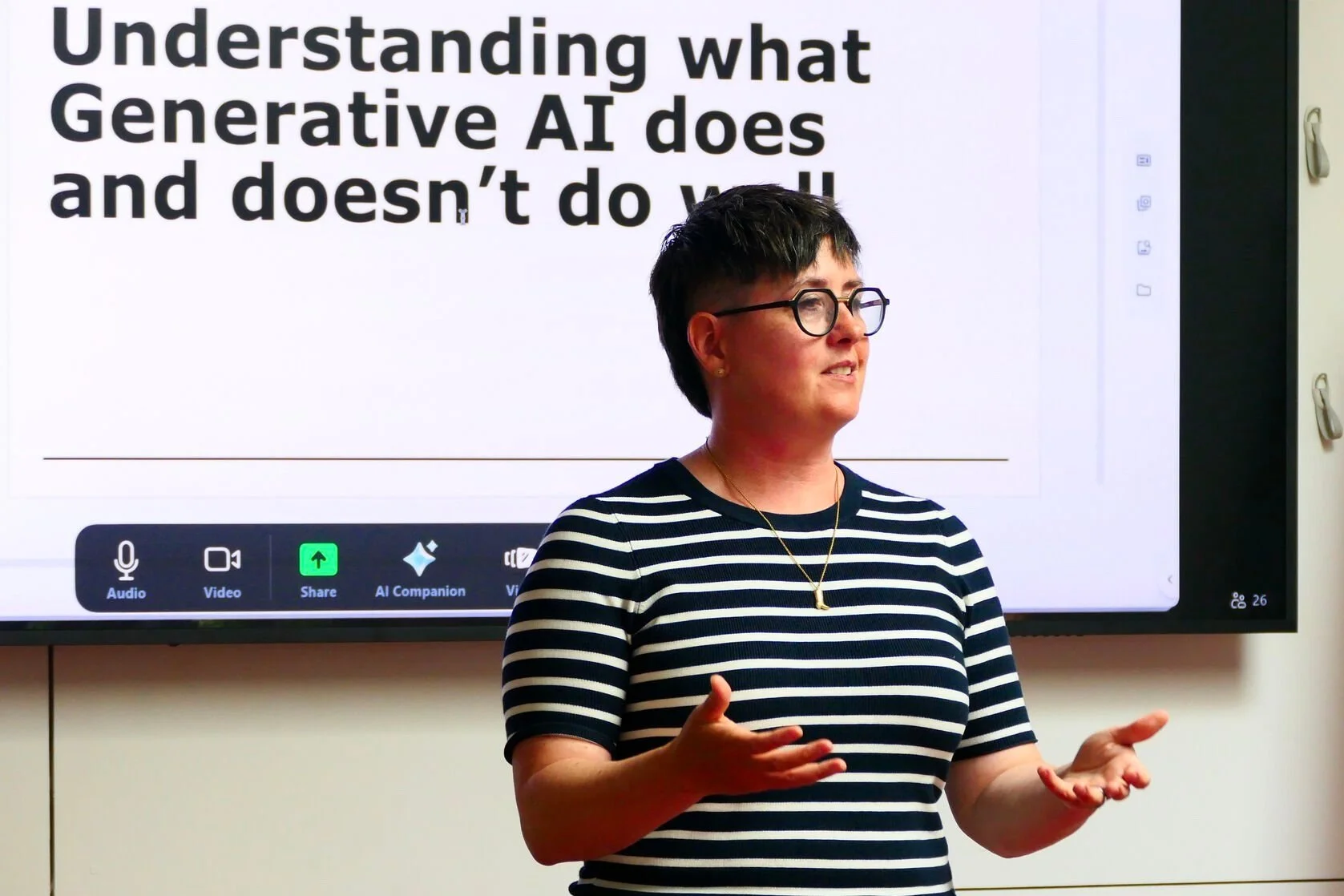
Your AI upskilling questions, answered
Each month we update our FAQ of top questions from clients about AI literacy skills and upskilling non-technical teams.
AI upskilling for non-technical employees
FAQ
What are the most important AI skills for non-technical employees?
Non-technical employees need foundational AI skills such as AI literacy, prompt writing, workflow integration with tools like ChatGPT, and the ability to collaborate with AI in everyday tasks. These skills help teams use AI effectively without needing to code or build models. Read more about foundational generative AI skills for non-technical teams.
How do I start an AI upskilling program for my workforce?
Start by identifying the business goals for AI adoption, then define non-technical skill levels across your teams. Use an AI skills framework to map beginner, intermediate, and advanced use cases to roles. Begin with AI literacy workshops, then build toward tool-specific training and workflow integration. Learn more in our free ebook and AI upskilling framework for non-technical teams.
Do I need technical staff to teach AI literacy to our employees?
No. Most organizations can launch AI training programs for non-technical teams using external training partners, off-the-shelf content, or hands-on workshops focused on workplace applications. Our AI literacy workshops are built specifically for non-engineering teams and require no coding background. See how we teach AI skills to non-technical teams by previewing a free AI Learning Lab.
What’s the difference between AI literacy and technical AI training?
AI literacy focuses on understanding what AI is, how to use AI tools in daily work, and how to collaborate with AI systems like ChatGPT. Technical AI training, on the other hand, involves programming, data science, and model development, which is not required for most business teams. Learn more about building AI fluency for non-technical teams.
How can I measure the impact of AI skills training?
Move beyond course completions or attendance rates. Track behavior changes, improvements in task completion time, usage of AI tools in workflows, and increased productivity or creativity. Use metrics that reflect actual adoption and integration into daily work. Check out our free ebook for more AI literacy training metrics.
How long does it take to see results from AI upskilling?
Most teams see impact within weeks when training focuses on practical, tool-based skills. Early wins include time saved on repetitive tasks, faster content creation, and improved team collaboration with AI assistants like ChatGPT.
Can we customize the AI training for our organization?
Yes, we encourage it. We offer customized AI skills training workshops and AI Learning Labs tailored to your organization’s roles, industry, and readiness level. Our programs are built to align with your internal goals, tools, and skill levels, and we support both pilot and enterprise-wide rollout. Book an introductory call with us to explore your customization options.
What is the best way to train employees on ChatGPT and generative AI tools?
Use hands-on AI workshops that show real use cases specific to job roles. Training should include guided practice, prompt writing basics, and example workflows for tasks like drafting emails, summarizing documents, generating ideas, or creating reports with AI.
Is AI training relevant for leadership and executive teams?
Absolutely. Leaders need to understand AI's impact on strategy, workforce planning, and decision-making. Executive AI bootcamps can quickly get leaders up to speed so they’re prepared for evaluating AI tools, ask the right questions, and lead teams through AI-driven transformation. We recommend educating executives about AI as one of your first steps in the AI upskilling journey to increase buy-in from leadership.
What are AI agents in the workplace and how are they different from tools like ChatGPT?
AI agents are autonomous systems designed to carry out multi-step tasks with minimal human input. Unlike single-use AI tools, agents can make decisions, access data, and interact with systems or people based on goals — making them more powerful for task automation and workflow optimization.
Why should HR and L&D teams pay attention to AI agents?
AI agents are reshaping how work gets done across functions. As they become embedded in business operations, employees need new skills to interact with them effectively. L&D teams have a key role in preparing the workforce to collaborate with agents, manage agent-augmented workflows, and rethink role boundaries. We work with talent development and HR workforce teams to define the skills needed for AI fluency on non-technical teams to prepare employees for AI agents in the workplace.
How should we redesign workflows to integrate AI tools and agents?
Start by mapping current workflows and identifying repetitive, rules-based tasks that can be automated. Then, reassign higher-value work to human roles, embed AI tools or agents into the task flow, and retrain teams on new ways of working. Involve employees in redesign discussions to support adoption.
How can we train teams to adapt to AI-driven workflow changes?
Offer hands-on workshops that walk through redesigned workflows, demonstrate agent-supported processes, and guide employees through practice tasks. Focus on change readiness, collaborative use of AI, and building confidence in working with automation. Training your workforce to understand and work alongside AI agents is the next step in AI readiness, after an initital generative AI skills training. We offer a workshop specifically focused on work redesign for AI agents.
